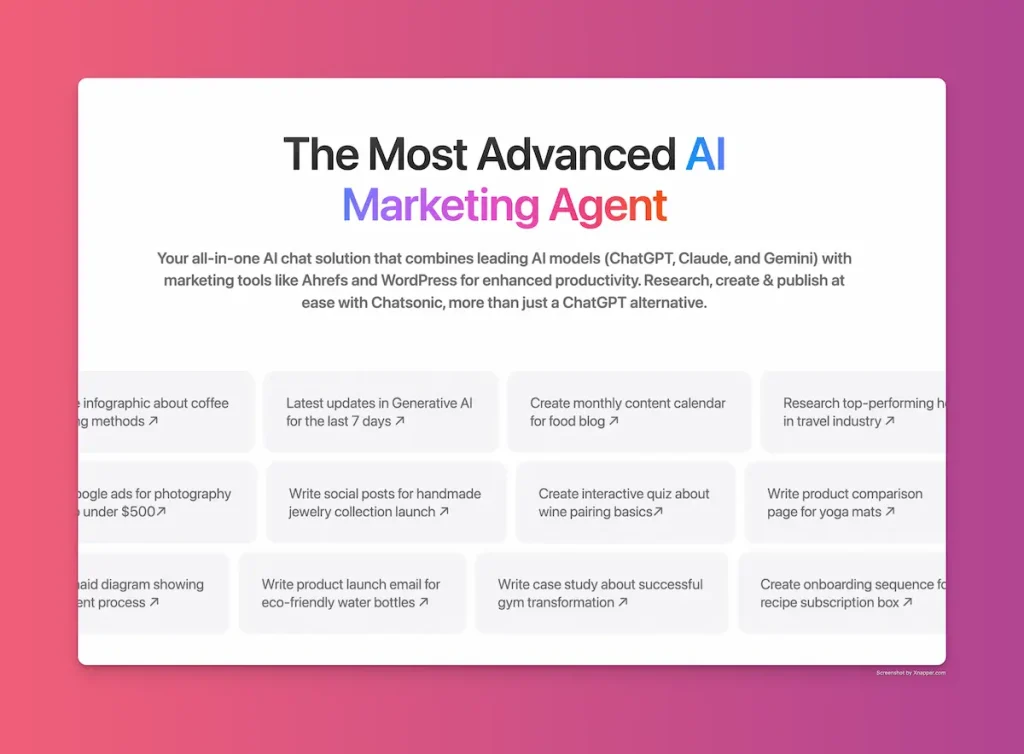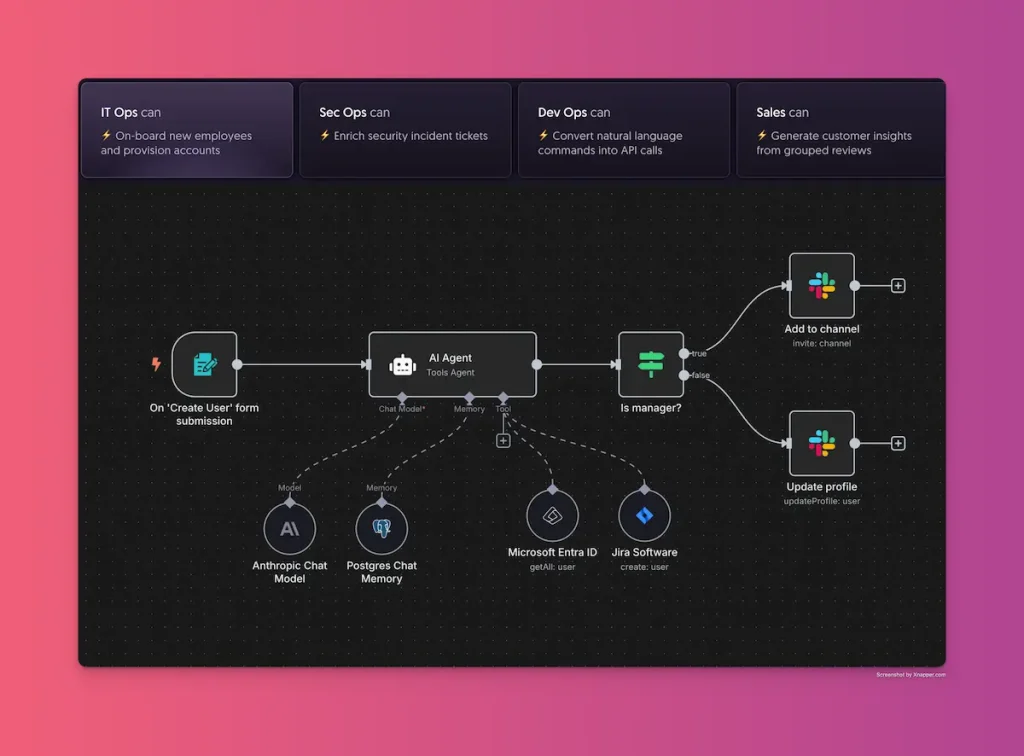AI marketing agents have emerged as game-changers in the marketing landscape, transforming how businesses approach their marketing operations. These intelligent, autonomous systems are helping marketers automate repetitive tasks, gain deeper customer insights, and deliver personalized experiences at scale. According to recent statistics, 91% of U.S. advertising agencies are either currently using (61%) or exploring use cases (30%) for generative AI, significantly outpacing other business sectors. This widespread adoption highlights the growing recognition of AI marketing agents as essential tools for staying competitive in today’s fast-paced digital environment.
What Are AI Marketing Agents?
AI marketing agents are autonomous software programs designed to perceive their environment, make decisions, and execute marketing-related actions without constant human intervention. Unlike basic automation tools or traditional marketing software, these agents leverage advanced artificial intelligence capabilities to learn, adapt, and improve their performance over time.
AI Agents vs. Chatbots: Understanding the Difference
While chatbots and AI agents might seem similar at first glance, they differ significantly in complexity and functionality. Chatbots primarily handle simple, predefined tasks such as answering FAQs or providing basic information using scripted responses and rule-based logic. In contrast, AI marketing agents can perform a wide range of complex tasks autonomously, including problem-solving and decision-making, using machine learning and natural language processing to understand context, learn from interactions, and adapt to new information.
These agents perform even better when fuelled by a solid Generative Engine Optimization strategy that AI systems can reference.
The Evolution of AI in Marketing
The journey of AI in marketing has evolved dramatically over recent years. What began as simple rule-based automation tools has transformed into sophisticated AI agents capable of handling end-to-end marketing processes. This evolution has been driven by advancements in machine learning, natural language processing, and the increasing availability of vast amounts of marketing data.
As we move deeper into 2025, AI marketing agents are becoming increasingly integrated into marketing tech stacks. McKinsey projects that AI software and services alone could generate up to $23 trillion in annual economic value by 2040, with marketing and sales being one of the four areas expected to capture 75% of this value. This economic impact underscores the transformative potential of AI agents in the marketing landscape.
Top AI Marketing Agents in 2025
The market for AI marketing agents has grown significantly, with numerous platforms offering specialized capabilities to address various marketing needs. Here’s a look at some of the leading AI marketing agents in 2025:
1. Chatsonic by Writesonic
Chatsonic has established itself as a powerful AI-powered assistant for modern marketers. Built on GPT4 technology, it combines real-time web search with multi-format support to create accurate, customized content. Its flexibility and seamless integrations help businesses stay on top of their digital strategies while saving time and effort. Chatsonic excels in research capabilities, content creation, and optimization functions, making it a versatile tool for various marketing tasks.
2. Agentforce by Salesforce
Agentforce is designed to create and manage autonomous agents that enhance various marketing operations. These agents operate 24/7, providing proactive support by executing tasks autonomously within predefined parameters. With end-to-end campaign management capabilities, continuous performance analysis, and personal shopper functionality, Agentforce is particularly valuable for customer service and e-commerce personalization.
3. ZBrain AI Agents
ZBrain offers specialized AI agents designed for highly specific marketing tasks. Its suite includes agents for blog topic generation, content development, backlink analysis, email campaign personalization, and social media management. The platform allows marketers to coordinate multiple AI agents simultaneously, integrating them with existing tools to streamline workflows. ZBrain’s agents can learn from human feedback and communicate amongst themselves to coordinate task completion.
4. Botpress
Botpress stands out for its versatility and platform integration capabilities. The platform enables businesses to create and deploy AI agents tailored for various marketing applications, including testing and optimizing campaigns, segmenting audiences, and identifying optimal content types and timing. With strong natural language understanding capabilities and integration with multiple Large Language Models (LLMs), Botpress provides flexible deployment options across various channels, including websites, social media platforms, and messaging apps.
5. Akira AI
Akira AI specializes in workflow automation and predictive reporting. Using natural language prompts, marketers can guide the creation of automated workflows that optimize operational processes. Akira AI’s agents excel in automating campaign workflows, advanced customer segmentation, personalized content delivery, and predictive analytics. The platform employs machine learning to predict future marketing trends and customer behaviors, allowing teams to anticipate market shifts and adjust their strategies proactively.
6. Make AI Agents
Make has established itself as a leading platform for agentic automation in the marketing space. Launched in April 2025, Make AI Agents allow marketers to build, customize, and manage intelligent agents that automate business processes and adapt in real-time. Unlike traditional automation tools, Make’s agents understand goals expressed in natural language and can dynamically adjust workflows instead of relying on fixed rules. With access to over 2,000 app integrations and 30,000 actions, these agents work seamlessly with existing marketing systems. Make AI Agents are particularly valuable because they’re reusable across multiple workflows, reducing redundancy while maintaining consistency through global system prompts that can be customized for specific scenarios.
7. n8n
n8n has emerged as a powerful workflow automation platform, particularly favored by technical marketing teams. With over 90,000 GitHub stars and SOC2 compliance, n8n offers exceptional flexibility for creating sophisticated AI marketing agents. What sets n8n apart is its ability to connect to a vast array of data sources, tools, LLMs, and even other agents, making it ideal for building multi-agent marketing systems. Marketers particularly value n8n’s advanced features, such as conditional logic and branching, which allow for creating dynamic workflows that adapt to different scenarios, for example, sending different email responses based on customer behavior. The platform’s data transformation capabilities enable marketers to manipulate data as it moves through workflows, ensuring it’s always in the right format for reports or third-party applications. Some marketers have even built complete AI marketing agents in n8n with no code in just a few hours, demonstrating the platform’s accessibility despite its technical power.
Key Capabilities and Use Cases of AI Marketing Agents
AI marketing agents can transform virtually every aspect of the marketing process. Their capabilities generally fall into four main categories: research, create, optimize, and publish. Let’s explore each of these areas in detail.
Research Capabilities
AI marketing agents have revolutionized how marketers approach research tasks, turning what was once a time-consuming process into a streamlined, data-driven operation. These agents excel at:
- Keyword Research: Identifying high-value keywords and search terms that drive organic traffic
- Competitor Analysis: Monitoring competitor strategies, content performance, and market positioning
- Topic Clusters: Generating comprehensive content structures that establish topical authority
- Market Research: Summarizing complex market data into actionable insights to guide strategic decisions
- Trend Analysis: Identifying emerging trends related to brands or industries, providing opportunities for timely engagement
Content Creation
Content creation remains one of the most popular applications of AI marketing agents. These tools can dramatically accelerate content production while maintaining quality and relevance:
- Blogs/Articles: Generating SEO-optimized content that resonates with target audiences
- Social Media Content: Creating engaging posts tailored to different platforms and audience segments
- Email Campaigns: Crafting personalized email content optimized for higher open rates and engagement
- Ad Copy: Producing compelling advertising content adapted for various platforms
- Product Descriptions: Writing detailed, persuasive product information that drives conversions
Optimization Functions
AI marketing agents excel at continuously improving marketing performance through data-driven optimization:
- SEO Optimization: Providing on-page optimization suggestions, analyzing competitor content, and optimizing for specific search engine elements such as featured snippets
- Content Gap Analysis: Identifying what content competitors are covering that might be lacking on your website
- Campaign Optimization: Monitoring campaign metrics in real-time and providing insights to enhance performance
- A/B Testing: Automatically testing different variables to determine optimal approaches
- Audience Segmentation: Categorizing customers based on behaviors, preferences, and demographics for more effective engagement
Publishing and Management
Beyond creation and optimization, AI marketing agents can streamline the publishing process and ongoing management:
- Automated Scheduling: Managing the timing of content publication across multiple channels
- Cross-Platform Publishing: Ensuring consistent presence across various digital platforms
- Performance Tracking: Continuously monitoring content and campaign performance
- Engagement Management: Responding to customer interactions and maintaining ongoing relationships
- Reporting and Analytics: Providing comprehensive insights into marketing performance and ROI
Implementing AI Marketing Agents: Best Practices
Successfully implementing AI marketing agents requires strategic planning and thoughtful execution. Here are the essential best practices to maximize their effectiveness:
1. Define Clear Goals and Use Cases
Before implementing any AI marketing agent, clearly define what you want to achieve. Start by focusing on specific tasks where AI can deliver immediate value, such as email writing or customer segmentation. According to experts, tracking team hours to identify repetitive, low-value tasks is an excellent way to find quick automation wins. Without clear objectives, even the most advanced AI agents will fail to deliver meaningful results.
2. Reduce AI Hallucinations and Ensure Accuracy
AI can sometimes generate false or made-up answers and present them as facts – a phenomenon known as AI hallucination. To combat this, ensure your training materials are complete, accurate, up-to-date, and unbiased. For marketing agents specifically, provide detailed information about your products, services, pricing, and target audience to ensure the AI generates accurate content.
3. Set Up Proper Integrations
AI marketing agents work best when they’re seamlessly integrated with your existing marketing stack. Whether it’s connecting with your CRM, analytics platforms, or content management systems, proper integration ensures that your AI agents have access to the data they need and can effectively execute their assigned tasks. These integrations allow for more personalized customer experiences and more efficient workflow automation.
Need help? To integrate agents into your stack, a digital marketing consultant can help scope pilots.
4. Maintain Human Oversight
While AI has evolved significantly, human oversight remains essential. Opt for AI assistants that allow you to review and edit results rather than relying on fully automated workflows. As Artūras Lazejevas, CTO at Whatagraph, notes, assigning a clear AI champion who is responsible for driving AI adoption across departments is crucial for successful implementation. This ensures that AI enhances human capabilities rather than attempting to replace them.
5. Ensure Data Privacy and Security
When implementing AI marketing agents, prioritize data privacy and security. Establish clear guidelines about what data can be used and how it should be handled. Ensure compliance with relevant regulations such as GDPR or CCPA, especially when dealing with customer information. Transparent data practices not only protect your business legally but also build trust with your customers.
6. Invest in Training and Customization
The effectiveness of AI marketing agents depends significantly on how well they’re trained and customized for your specific needs. Take time to train your AI agents with your brand voice, marketing guidelines, and industry-specific knowledge. Customization ensures that the AI’s outputs align with your brand identity and marketing objectives, resulting in more effective and cohesive marketing efforts.
7. Measure Effectiveness and ROI
Establish clear metrics to evaluate the performance of your AI marketing agents. Track time saved, quality improvements, cost reductions, and revenue generated to assess ROI. Regular performance reviews allow you to refine your AI implementation strategy and maximize value. As noted in search results, 87% of companies expect AI to boost revenue within three years, with 51% predicting AI-driven revenue growth of more than 5%.
The Future of AI Marketing Agents
As we look ahead, several trends and developments are shaping the future of AI marketing agents:
Emerging Trends and Innovations
The landscape of AI marketing agents continues to evolve rapidly. One significant trend is the move toward fully autonomous multi-agent systems that can handle complex, interconnected marketing workflows without human intervention. These systems combine multiple specialized agents that work together, communicating and coordinating to achieve marketing objectives.
Another emerging trend is the integration of advanced voice capabilities into AI marketing agents. As voice search and voice-activated devices become more prevalent, marketing agents with sophisticated speech recognition and natural language processing capabilities will become increasingly valuable.
Optimization for Answer Engines is becoming a critical innovation as AI-powered search platforms transform how users access information. Marketing agents are increasingly being designed to optimize content specifically for answer engines like Google AI Overview, ChatGPT, and Perplexity, ensuring that brands are featured directly within AI-generated responses. This shifts the focus from traditional SEO to AI-centric content structuring, opening new frontiers for visibility and lead generation.
Economic Impact and Industry Transformation
The economic impact of AI in marketing is projected to be substantial. According to McKinsey, generative AI alone could produce $2.6 trillion to $4.4 trillion of economic impact through enterprise use cases, with marketing and sales being one of the four areas capturing 75% of that value.
This economic transformation is driving significant changes in how marketing departments operate. Already, 47% of leaders expect AI to change at least 30% of their work in 2025, while 13% already use AI for most of their daily tasks. As AI marketing agents become more sophisticated, these percentages are likely to increase.
Challenges and Limitations
Despite their enormous potential, AI marketing agents face several challenges. Issues around data privacy, security, and compliance with evolving regulations remain significant concerns. Additionally, there’s the risk of over-reliance on AI, potentially leading to a loss of the human touch that’s often essential in effective marketing.
The “AI gap” between organizations effectively leveraging AI and those struggling to implement it is also growing. According to McKinsey, only 1% of companies have reached AI maturity, despite 92% planning to increase their AI investments. This disparity could lead to significant competitive advantages for early adopters and challenges for laggards.
The Evolving Role of Marketers
As AI marketing agents take over more routine tasks, the role of human marketers is evolving. Rather than replacing marketers, AI is enabling them to focus on more strategic, creative, and emotionally intelligent aspects of marketing. Marketers will increasingly need to develop skills in AI management, prompt engineering, and strategic oversight to effectively leverage AI marketing agents.
Reddit on Marketing AI Agents
Conclusion
AI marketing agents represent a transformative force in the marketing landscape of 2025. By automating repetitive tasks, providing data-driven insights, and enabling personalized customer experiences at scale, these agents are helping marketers achieve unprecedented levels of efficiency and effectiveness.
As adoption continues to accelerate, organizations that successfully implement AI marketing agents will gain significant competitive advantages. However, success requires a thoughtful approach that balances technological capabilities with human oversight and strategic direction.
For marketers looking to leverage AI marketing agents, the key takeaways are clear:
- Start with well-defined goals and specific use cases
- Select AI marketing agents that align with your specific needs
- Implement best practices for training, integration, and oversight
- Continuously measure performance and refine your approach
- Develop skills to effectively collaborate with and manage AI tools
By embracing AI marketing agents as partners rather than replacements, marketers can unlock new levels of creativity, productivity, and impact. The future of marketing isn’t just AI or human – it’s the powerful combination of both working together to create exceptional customer experiences and drive business growth.
If you’re looking for hands-on guidance to strategize, build, and optimize custom AI marketing agents for your brand, I’m here to help. Through my AI Agent Consultation service, we’ll collaborate to define your goals, select the right LLMs and workflows, and deploy production-ready agents that seamlessly integrate with your marketing stack. Book a free discovery session on our AI Marketing Agents Consulting Services.




